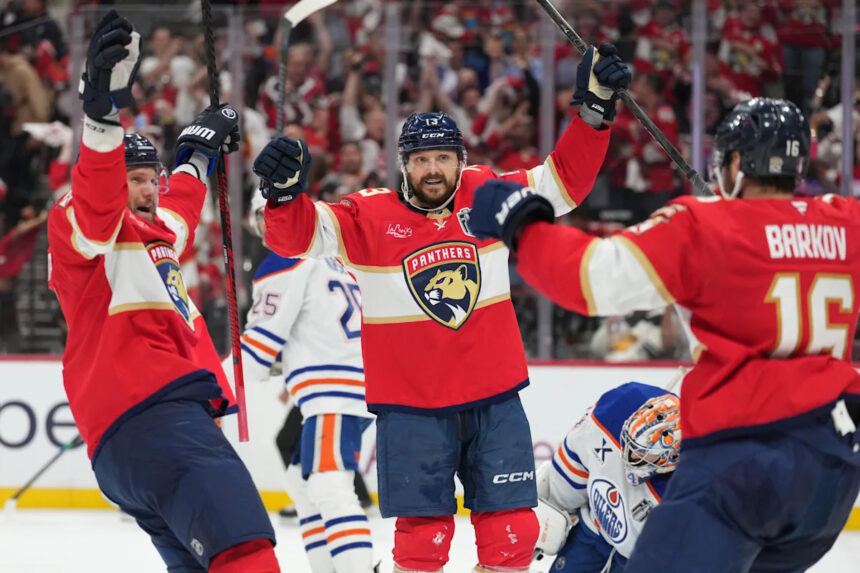In a moment that will be etched into hockey lore for generations, the Florida Panthers clinched their second consecutive Stanley Cup on Monday night, defeating the Edmonton Oilers in a decisive Game 6 victory. The win cements what many analysts are now calling a modern NHL dynasty—a remarkable achievement for a franchise that spent decades in relative obscurity before their recent transformation.
The Panthers’ journey to back-to-back championships represents more than just athletic excellence; it symbolizes a seismic shift in hockey’s cultural landscape. No longer can the sport be viewed exclusively through the lens of traditional powerhouse markets like Toronto, Montreal, or Boston. Florida—a state once derided for its supposedly lukewarm embrace of winter sports—has become the epicenter of hockey excellence in North America.
Sam Reinhart emerged as the unlikely hero of the clinching game, scoring an astounding four goals in a performance that will be discussed in reverent tones by hockey aficionados for years to come. His surgical precision around the net transformed what could have been a tense, nail-biting affair into a commanding Panthers victory. Reinhart’s playoff performance caps off a remarkable individual season that saw him notch 57 goals in the regular season, establishing himself as one of the premier scoring threats in the league.
“This team never stopped believing,” said Panthers captain Aleksander Barkov, clutching the Stanley Cup amidst a shower of champagne and confetti. “We faced adversity all season, but our identity never changed. We’re built on resilience, and tonight that paid off in the biggest way possible.”
The championship marks a profound vindication for general manager Bill Zito, whose strategic roster construction has revolutionized the franchise. When Zito took over in 2020, the Panthers were still searching for an identity. Four years later, they’ve established a template that other NHL franchises are scrambling to emulate—combining defensive discipline with opportunistic scoring and elite goaltending from Sergei Bobrovsky.
For the Oilers, the defeat represents another chapter in their ongoing quest to recapture championship glory. Despite boasting generational talents Connor McDavid and Leon Draisaitl—both of whom performed admirably throughout the series—Edmonton ultimately couldn’t match Florida’s depth and systematic execution. The series exposed the gap that still exists between having elite individual performers and constructing a complete championship roster.
The victory party in Sunrise, Florida, began well before the final buzzer, as Panthers fans—many of whom have weathered decades of disappointment—sensed the inevitability of their team’s triumph. The arena erupted into a cacophony of joy and disbelief as the clock wound down, with many supporters openly weeping at the realization that their once-beleaguered franchise had ascended to the very pinnacle of the sport.
“This isn’t just a hockey victory; it’s a cultural phenomenon,” said longtime Panthers season ticket holder Maria Rodriguez. “People used to joke about hockey in Florida. Nobody’s laughing now.”
As the Panthers embark on their championship celebration, questions inevitably turn to the possibility of a three-peat—a feat not accomplished in the NHL since the New York Islanders won four consecutive championships from 1980-1983. With their core players locked into contracts and a system that has proven devastatingly effective, the foundation certainly exists for continued dominance.
What makes this Panthers team particularly fascinating from a cultural perspective is how they’ve managed to blend traditional hockey virtues—grit, defensive responsibility, and opportunism—with a distinctly modern approach to the game that emphasizes skill and creativity. They’ve become, in many ways, a perfect reflection of evolving trends in professional sports: adaptable, analytically-informed, yet deeply committed to the timeless principles that define championship teams.
As the Stanley Cup makes its way to South Florida for the summer, one thing becomes abundantly clear: the NHL’s balance of power has shifted. The Panthers have established themselves not merely as champions, but as the standard-bearers for a new era in hockey. And for a sport constantly seeking to expand its footprint beyond traditional markets, Florida’s ascendance represents a compelling narrative that transcends the confines of the rink.
The question now isn’t whether the Panthers deserve recognition among hockey’s elite franchises—that debate has been settled definitively with back-to-back championships. The question is how many more Cups this remarkable group might add to their growing legacy before their remarkable run concludes. If their performance this season is any indication, hockey fans would be wise not to bet against them.










